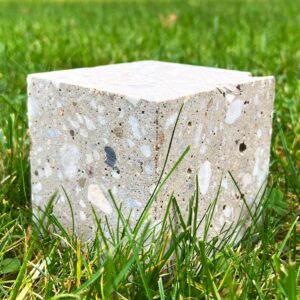Sustainability in the cement production

The Chair of Mineralogy is successively expanding its competences in the field of sustainability. Since 2020, we are part of the global research network INNOVANDI. Promoting the achievement of climate protection goals through the promotion of sustainable basic research and the networking of academic and industrial partners are the primary objective here. We are currently working on a number of funded projects in this research area at the Chair of Mineralogy, which deal, for example, with the clarification of the carbonation mechanisms of cementitious phases and their interaction in the complex system – as well as the reuse of recycled building materials. Besides the ongoing attempt to increase the efficiency of the current Portland cement-based binders, we are also working on the use of activated magnesium silicates as new binders for concrete.
Since 1990, the cement industry in Germany has succeeded in reducing CO2 emissions in the order of 20-25 % [1]. However, the cement industry is increasingly reaching its limits with conventional measures to further reduce its CO2 emissions. For this reason, innovative solutions for more sustainability are in demand. Promising ideas and different approaches have already been developed and partly implemented, such as the partial replacement of the primary raw material limestone by other materials or recycled building materials, as well as the capture and binding of the captured CO2 (CCU/CCUS).
Our projects provide an important contribution to reduce the global anthropogenic CO2 emissions of the binder industry from currently 5-7% of total emissions.
Prof. Dr. J. Neubauer, Dr. rer. nat. D. Jansen
[1] Verein Deutscher Zementwerke, VDZ (2021); Umweltdaten der Deutschen Zementindustrie 2021; vdz-online.de/wissensportal/publikationen/umweltdaten-der-deutschen-zementindustrie-2021;
